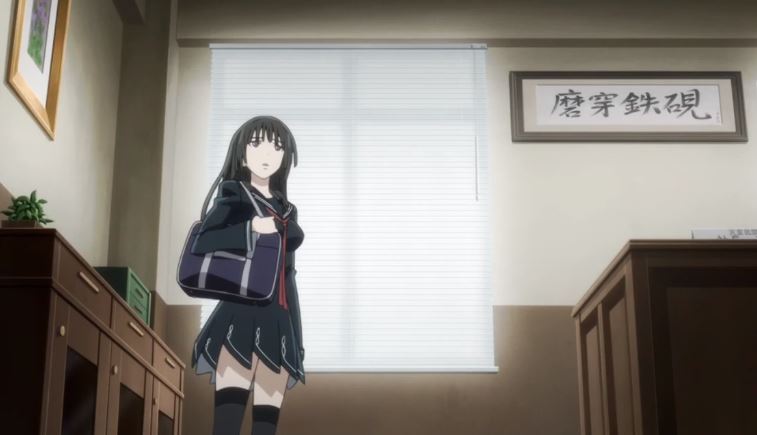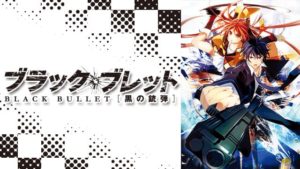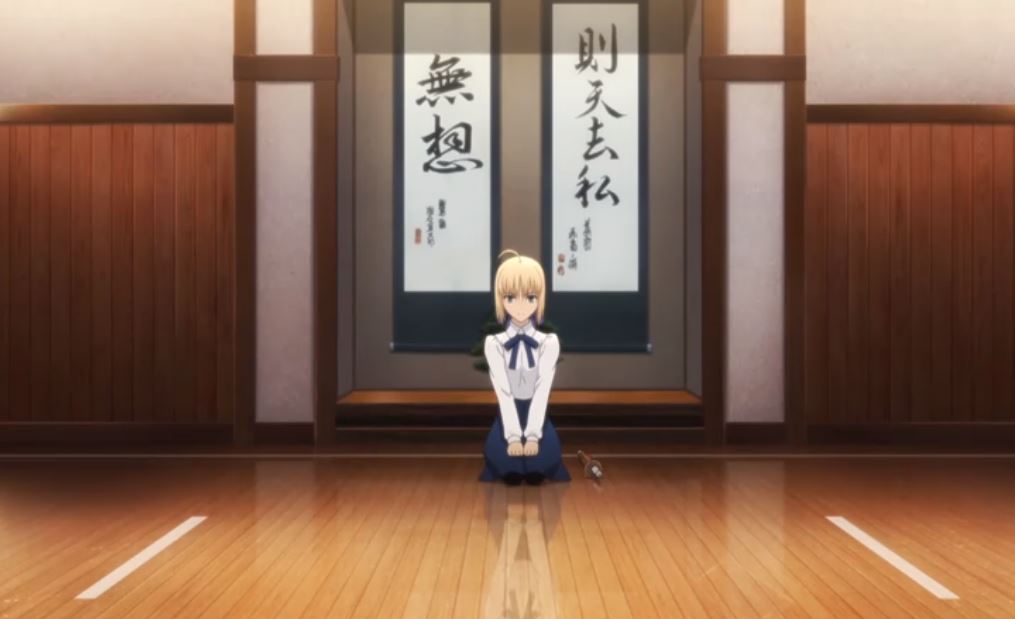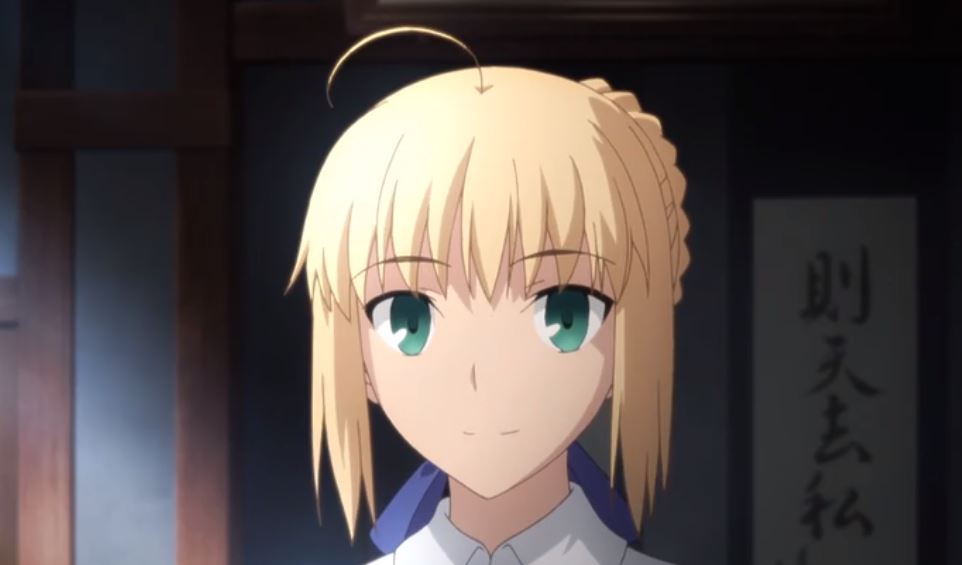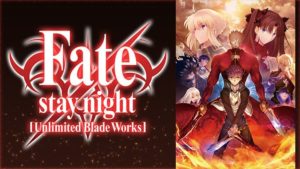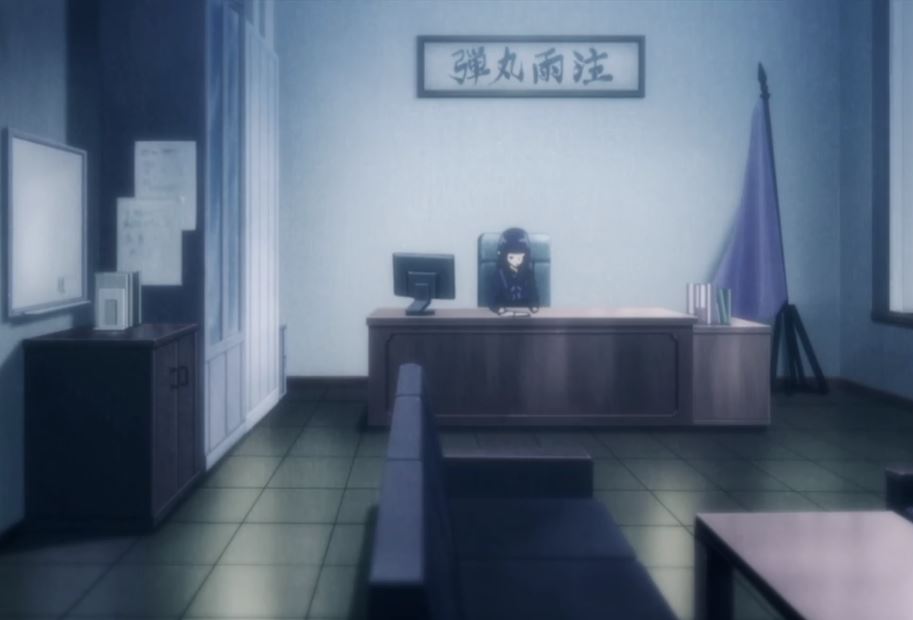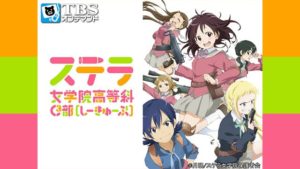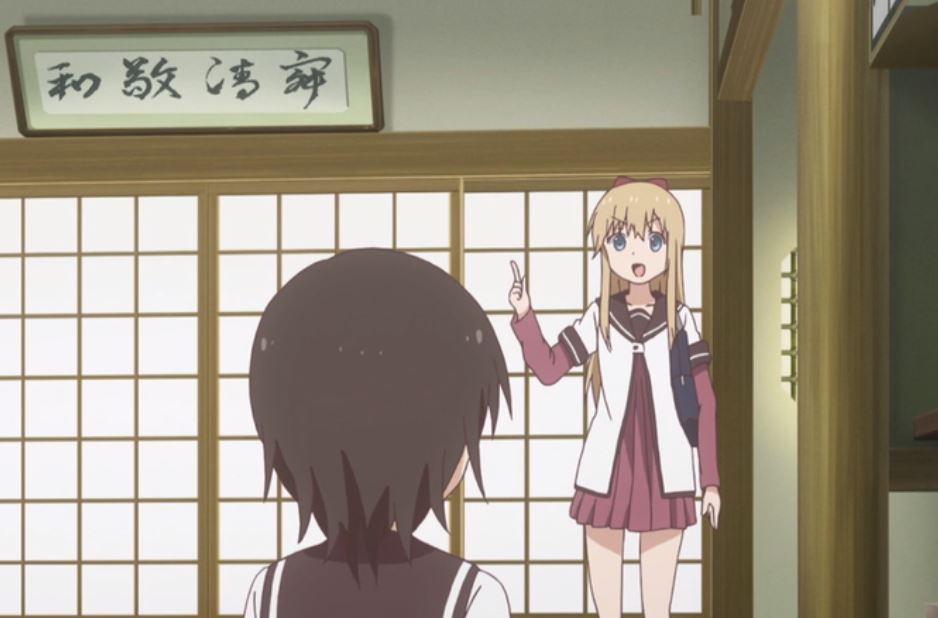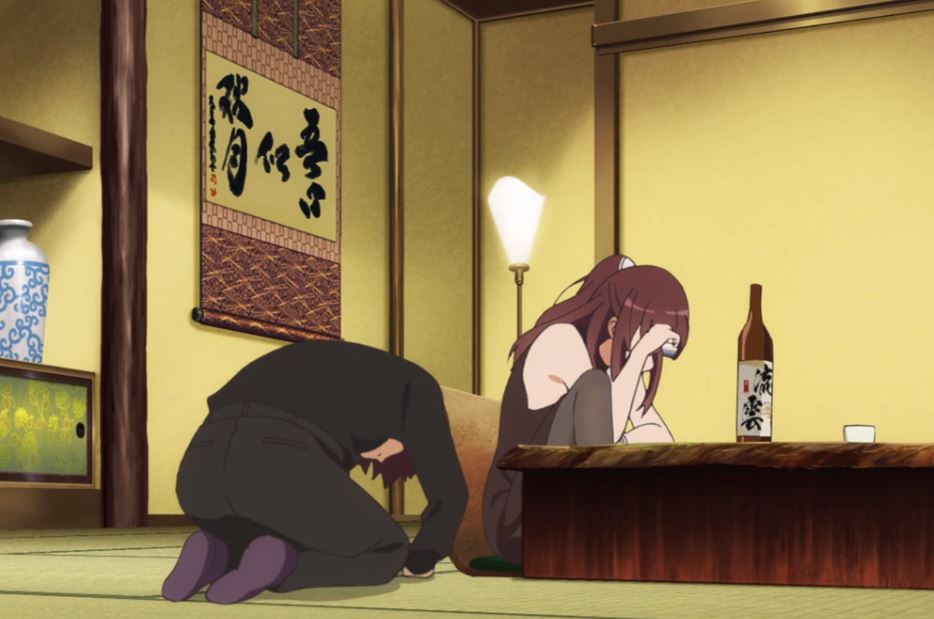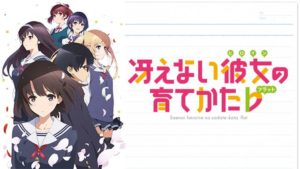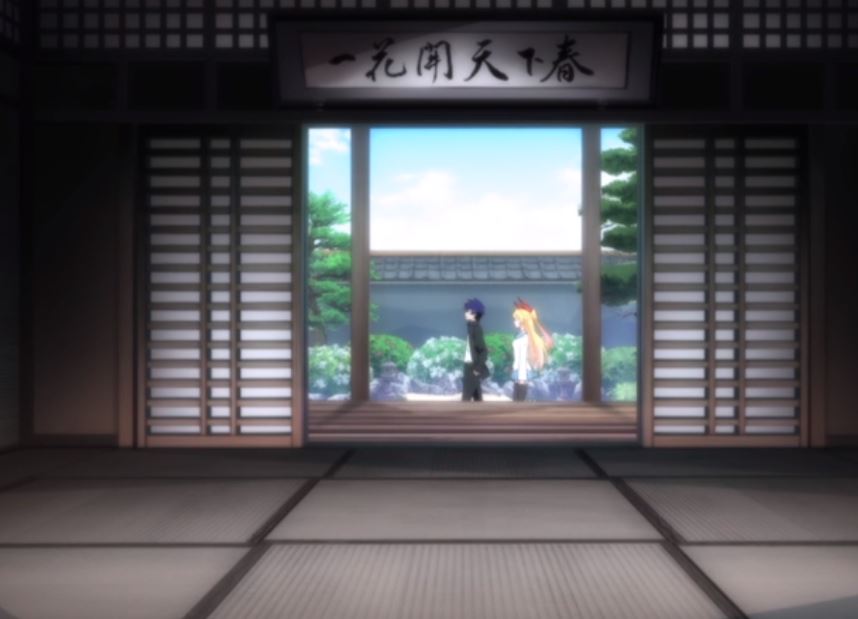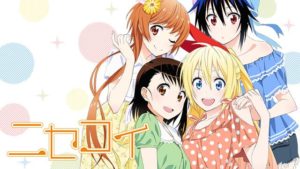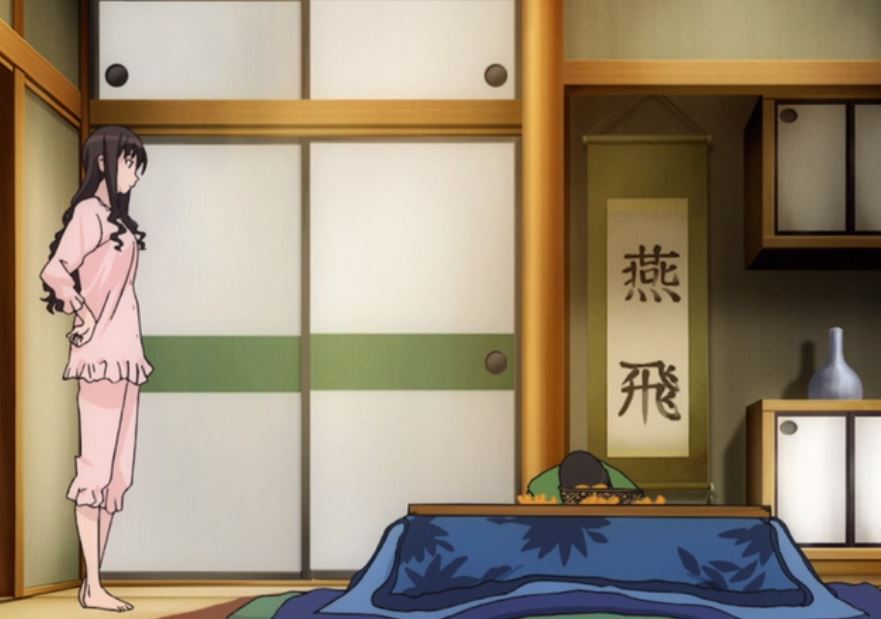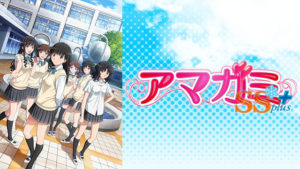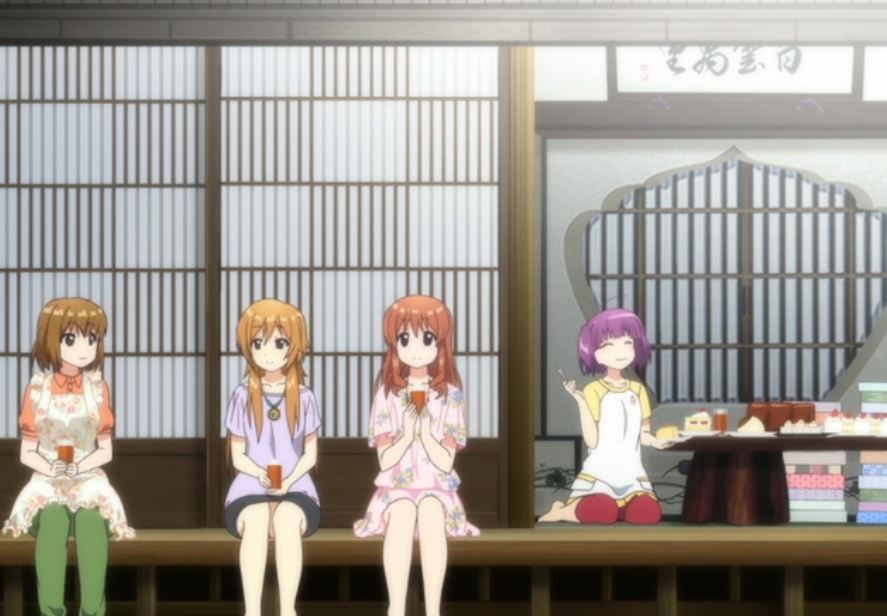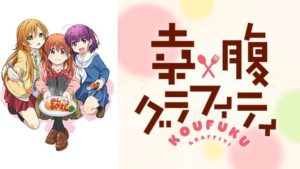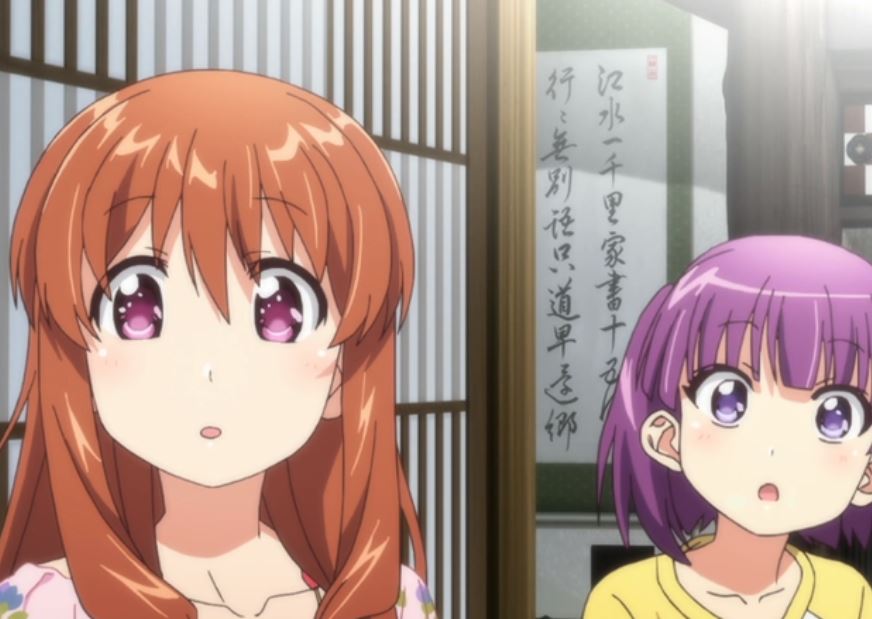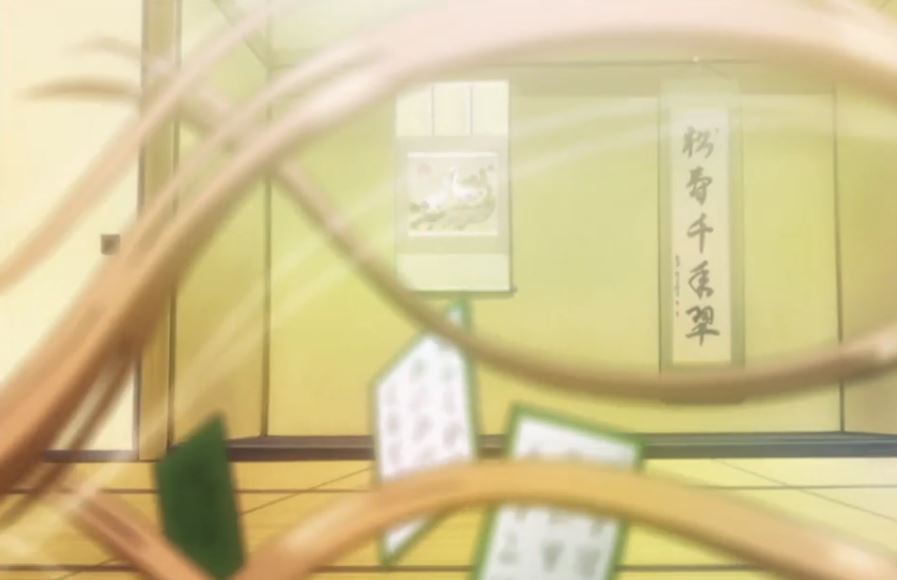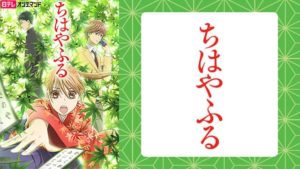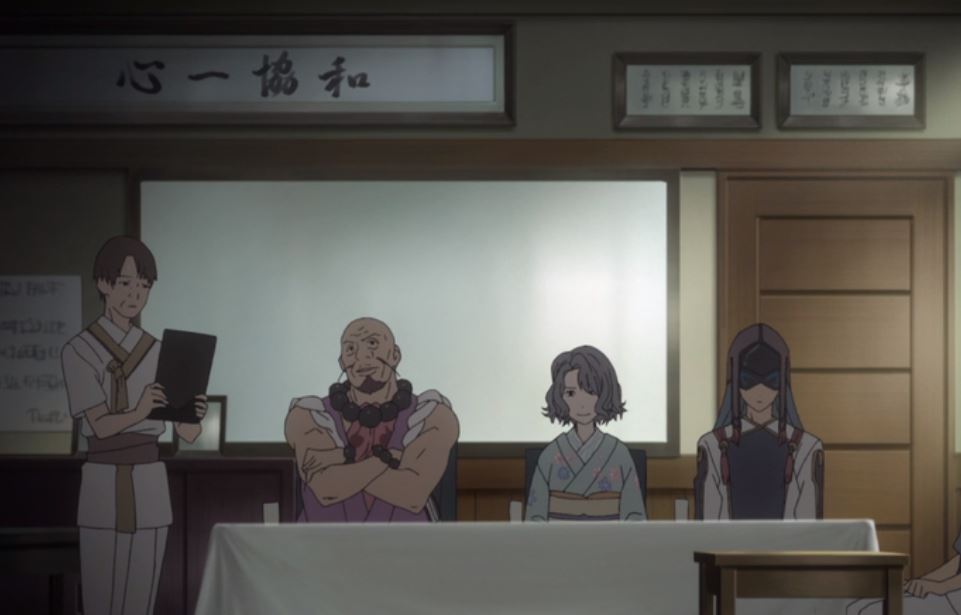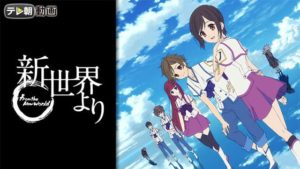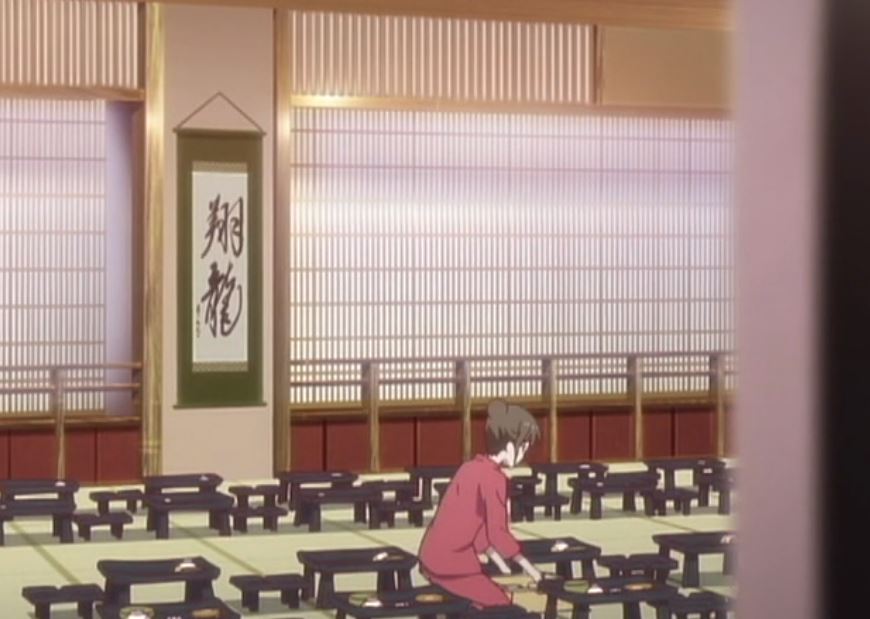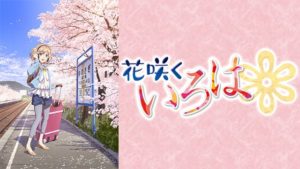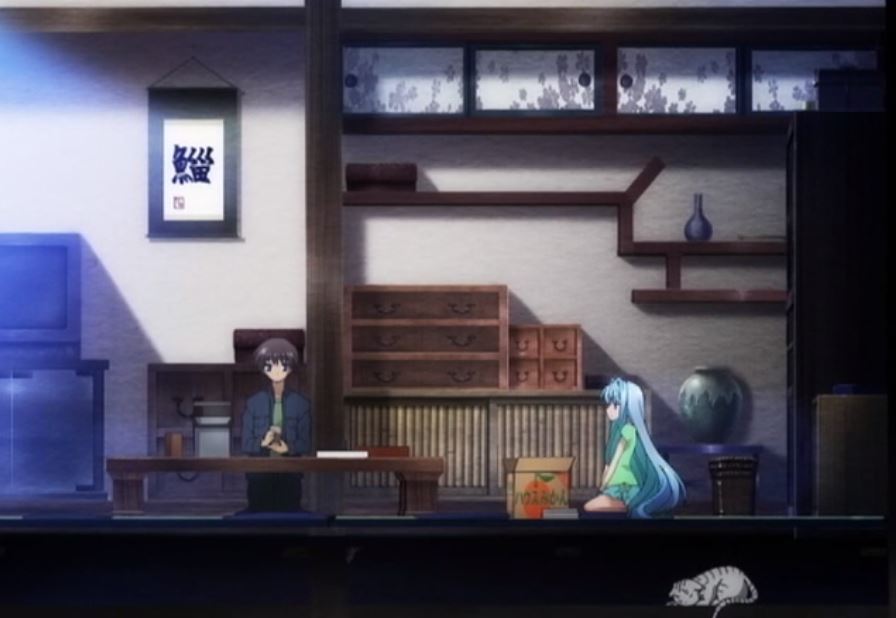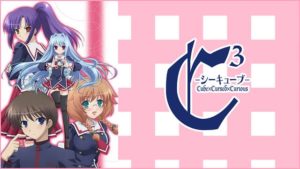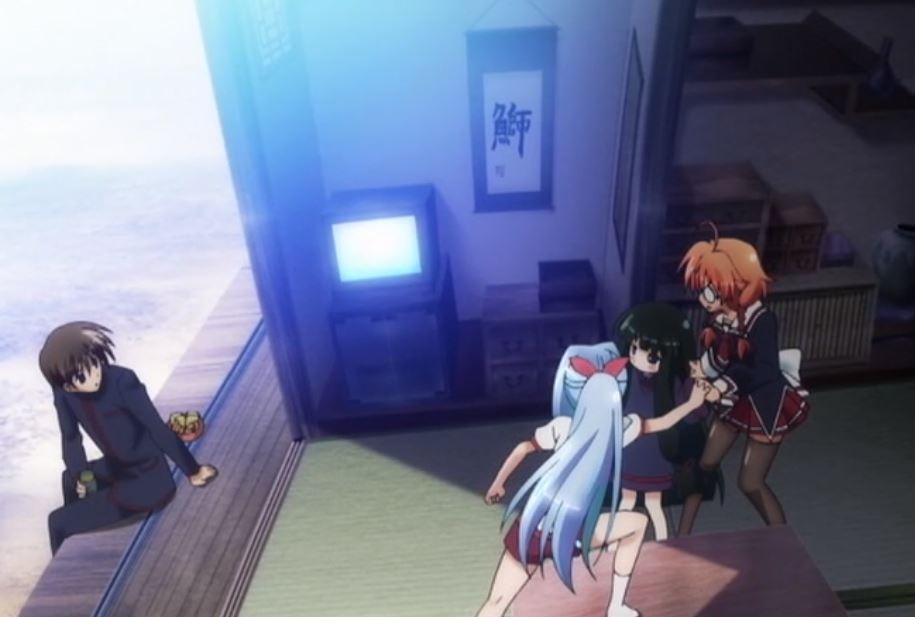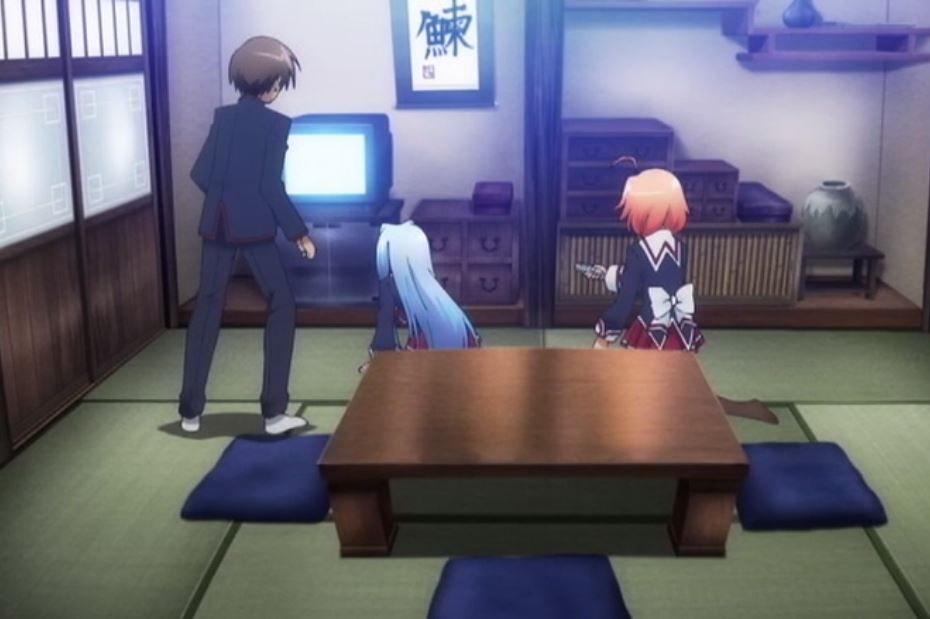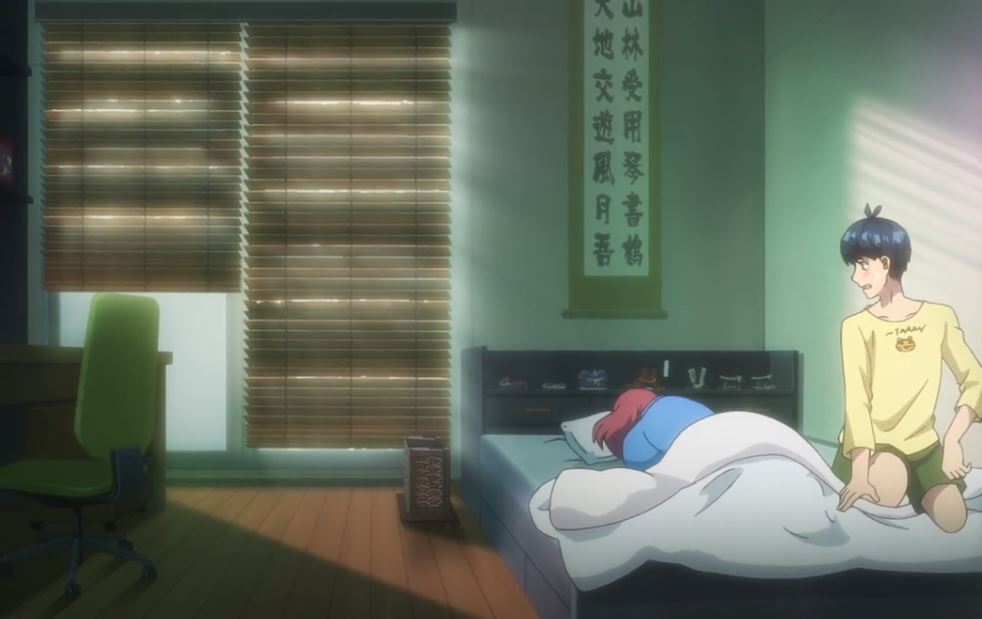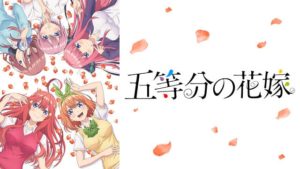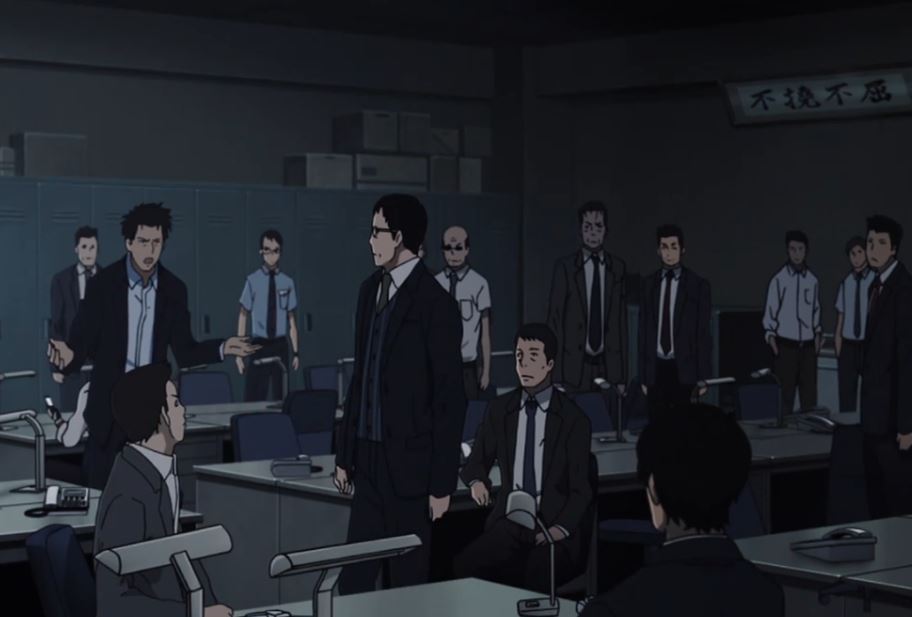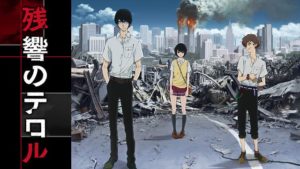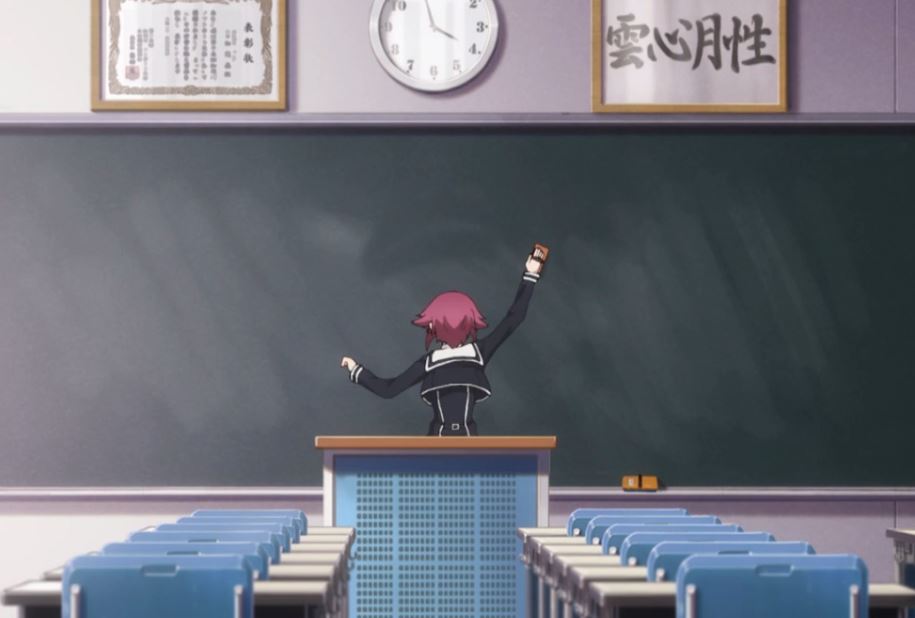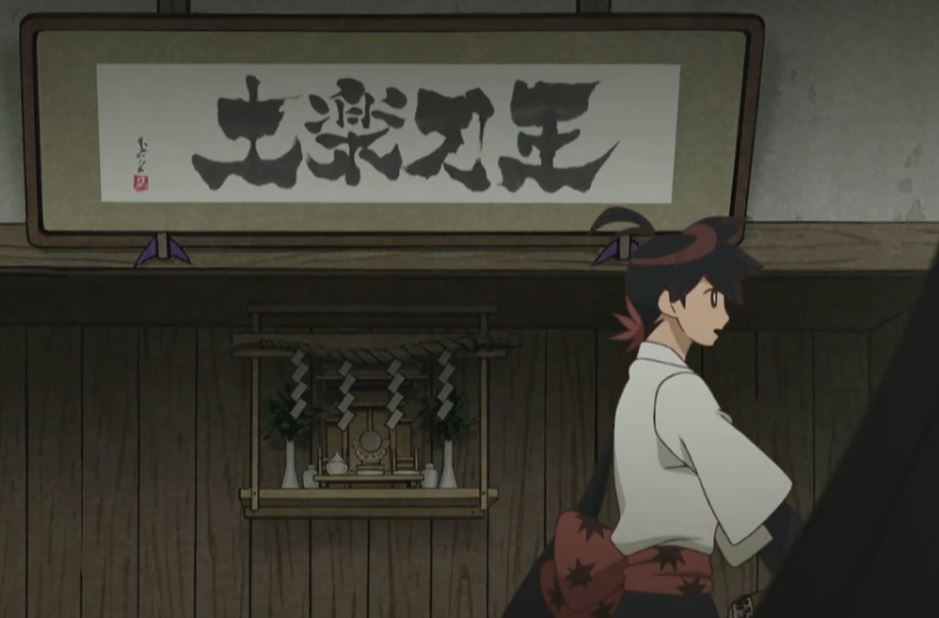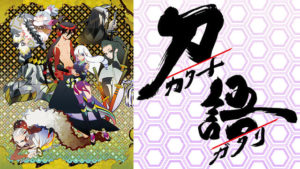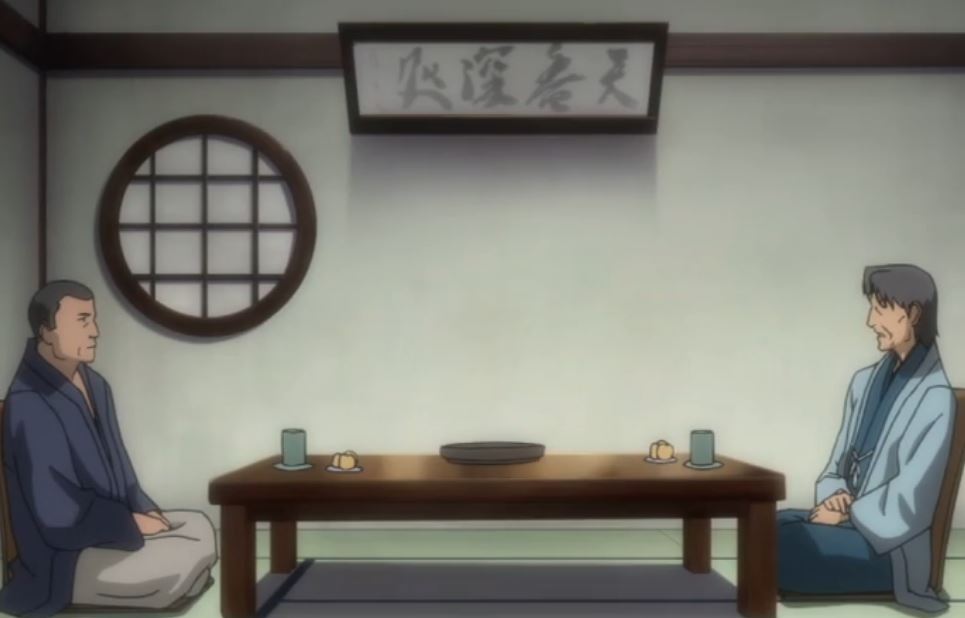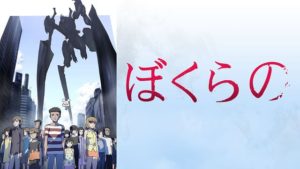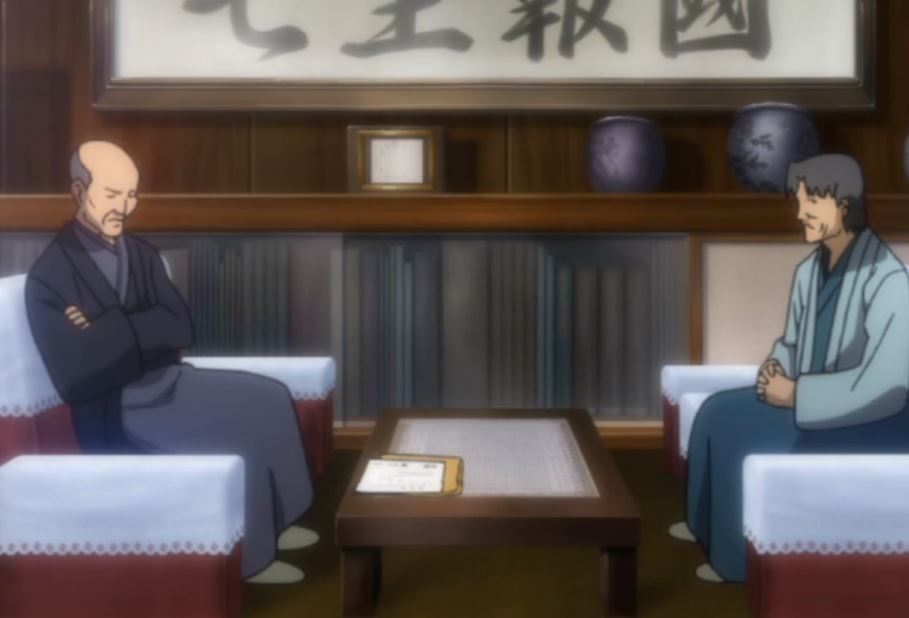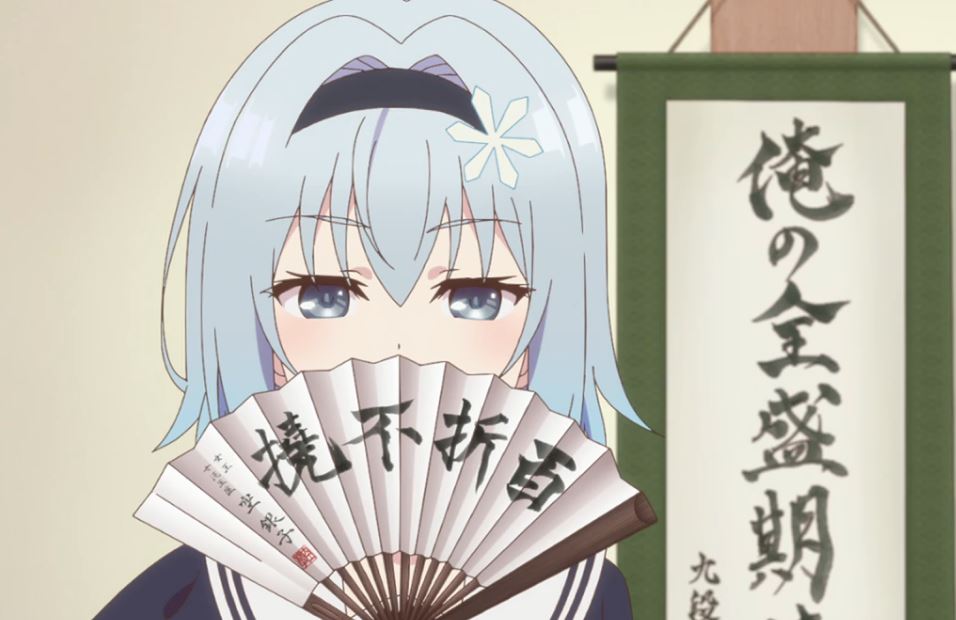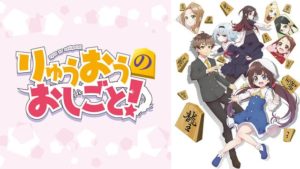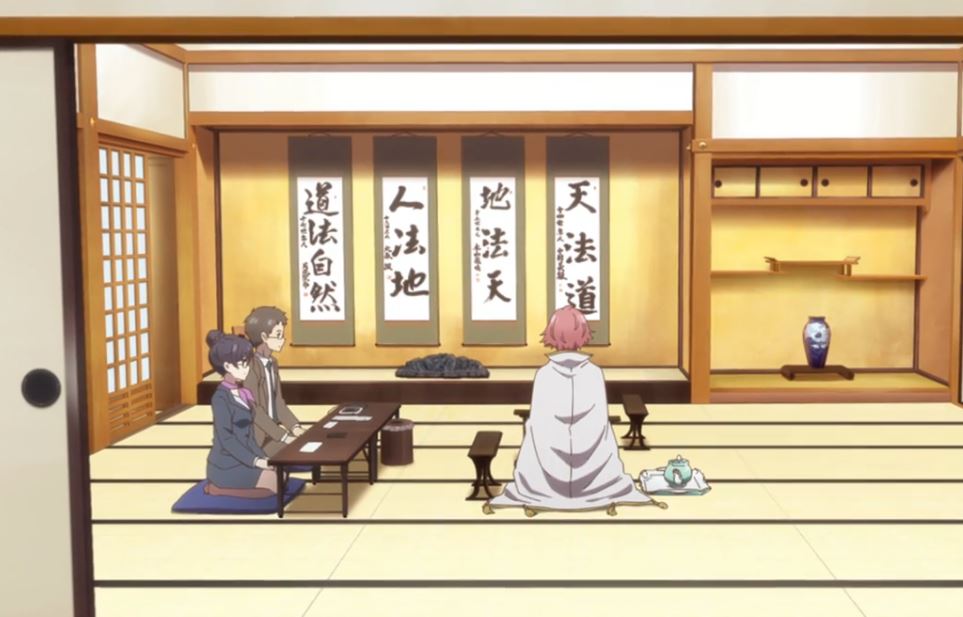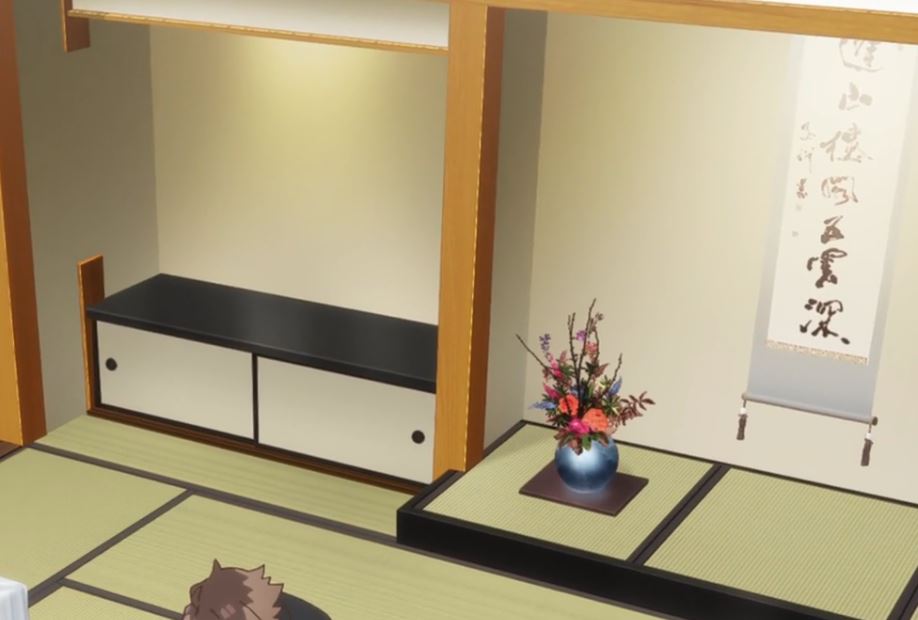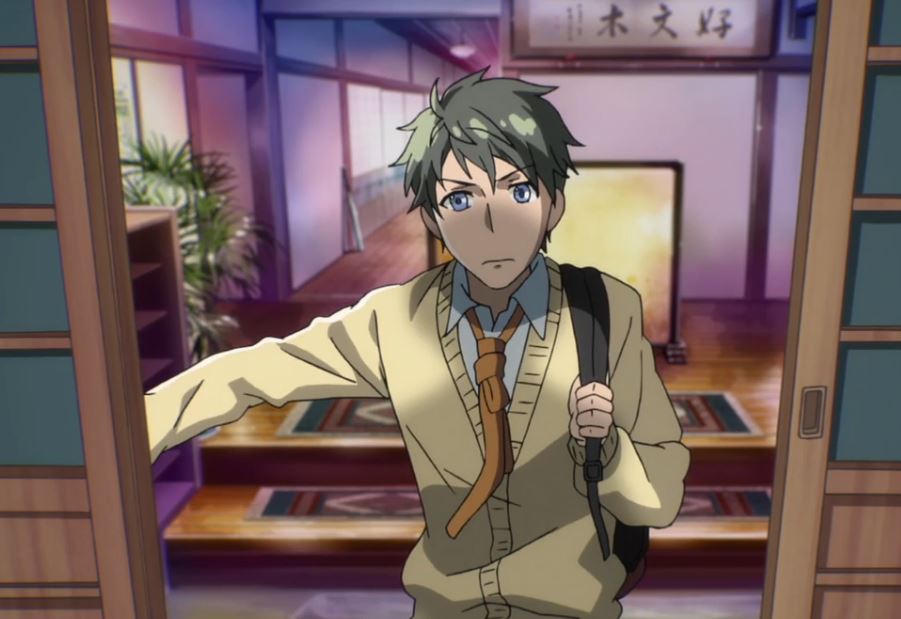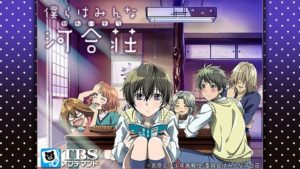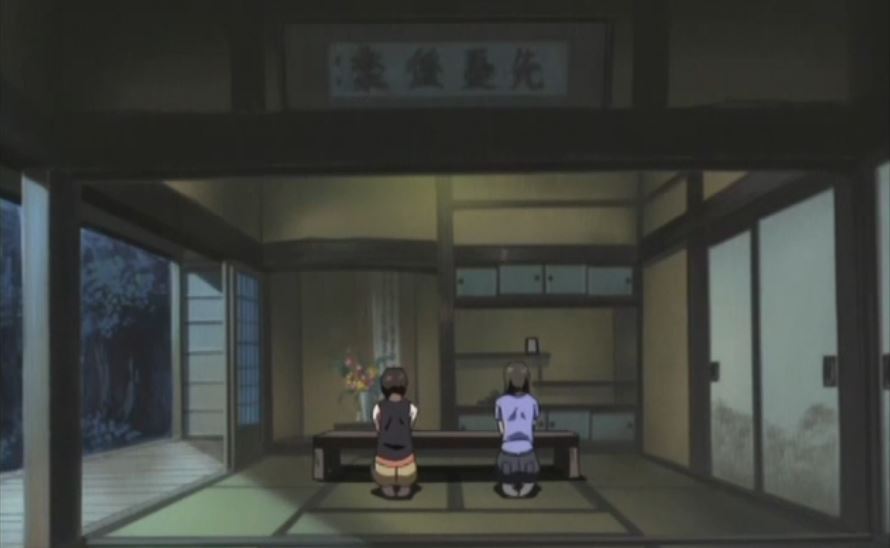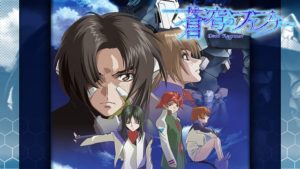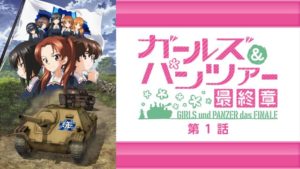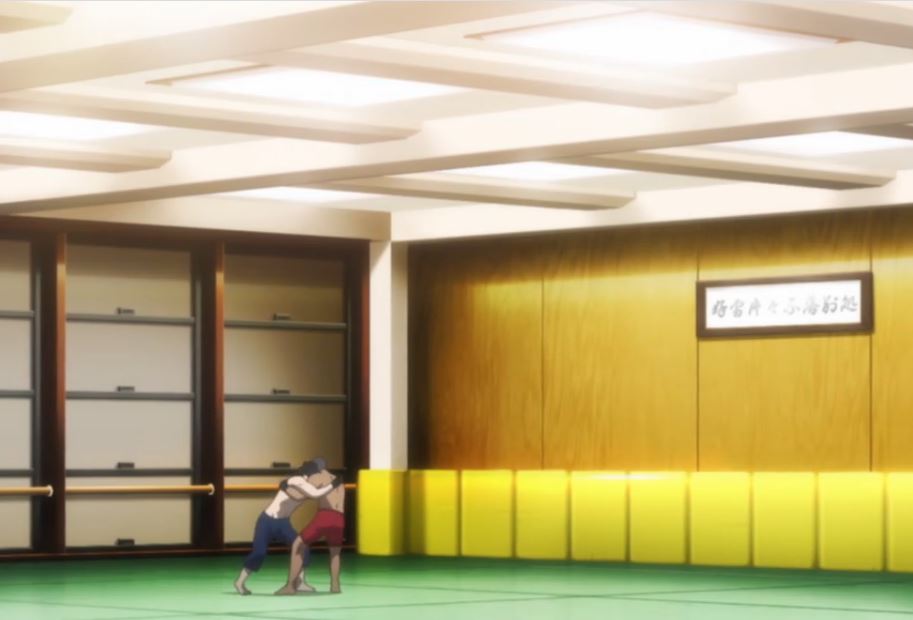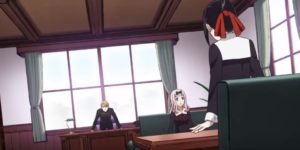Kanji in Anime (Level: Hard)
“磨穿鉄硯” (Masen Tekken)
©2013 神崎紫電/KADOKAWA アスキー・メディアワークス刊/ブラック・ブレット製作委員会
“磨穿鉄硯” (Masen Tekken) means to study hard enough to make a hole in an ink stone (stationery made of stone used to grind sumi with water) made of iron by grinding it down. This means not changing your activities until you achieve it with a strong will or studying hard without taking a break. It is a four-character idiom that is rarely used.
©2013 神崎紫電/KADOKAWA アスキー・メディアワークス刊/ブラック・ブレット製作委員会
“Black Bullet” is a dark S/F anime depicting the battle of humans living in a huge wall “monolith” to protect themselves from attacks by viral parasites. This kanji is placed in the president’s office of a private security company. Kisara Tendou, the president and master of the art of drawing a sword, probably chose the four-character idiom “磨穿鉄硯” (Masen Tekken) in order to devote himself to the management of the company and the study of the art of drawing a sword.
則天去私 (Sokuten Kyoshi)
©TYPE-MOON・ufotable・FSNPC
“則天去私” (Sokuten Kyoshi) is a term coined by Soseki Matsume to describe the ideal state of literature and life in his later years. The meaning is not to be obsessed with a small self, but to leave one’s body to heaven, earth and nature to live.
©TYPE-MOON・ufotable・FSNPC
The character is used in the kendo hall of the house of Shirou Emiya in the anime “Fate Stay Night UBW” which depicts the battle between a magician and a servant to obtain the Holy Grail, which fulfills a universal wish. Kiritugu Emiya, the founder of the kendo hall, is a family-friendly man, but also a hit man with a belief that he will cut off his minority to save the majority. In the end, he ended up living like a recluse in his later years, with the opposite result to his own creed. This background probably made him choose kanji “則天去私” (Sokuten Kyoshi).
弾丸雨注 (Dangan Uchuu)
©月眠/ステラ女学院保護者会
“弾丸雨注” (Dangan Uchuu) means that a bullet is coming in a rain of violence. This word is rarely used in everyday life.
©月眠/ステラ女学院保護者会
“Stella Women’s Academy High School Division Class C3” is an anime in which high school girls play a survival game during club activities. This kanji is displayed in the room of Rin Haruna, the ace of the sabbatical club. Since she uses the M3 submachine gun (M3 grease gun), her motto is probably the kanji for “弾丸雨注” (Dangan Uchuu).
和敬清寂 (Wakei Seijaku)
(C)2015 なもり/一迅社・七森中ごらく部
“和敬清寂” (Wakei Seijaku) is a slogan to show the knowledge of tea ceremony. It means that the host and guests relax and respect each other and cleanse the furnishings in the tea room and the atmosphere of the tea ceremony. The 1000 Rikyu families especially valued this slogan as “四規” (Shiki, four rules) meaning ‘和’ (Wa, harmony), ‘敬’ (Kei, respect), ‘清’ (Sei, purity), and ‘寂’ (Jaku, tranquility) established by SEN no Rikyu. This time, I would like to introduce the meaning of Kanji “four rules” which was emphasized by Rikyu.
(C)2015 なもり/一迅社・七森中ごらく部
“Yuri Yuri” is a comedy anime set in a private girls’ school with the themes of loose gags and loose lilies. In the 3rd series “YuruYuri San ☆ Hai!”, this kanji is displayed in the room of the tea ceremony club. It is not certain that these women, who enjoy harmonious relationships and women’s talk, know this kanji. However, this four-character “和敬清寂” (Wakei Seijaku) matches very well with Japanese tea room.
吾心似秋月 (Waga Kokoro Syuugetsu ni Nitari)
©2017 丸戸史明・深崎暮人・KADOKAWA ファンタジア文庫刊/冴えない♭な製作委員会
“吾心似秋月” (Waga Kokoro Syuugetsu ni Nitari) is a Zen word and a passage from “寒山詩” (Kanzanshi) written by Kanzan, a Zen priest in the Tang dynasty of China. This means “My heart is like autumn moon.” and represents a state of enlightenment. Even the Japanese know few of these words. On the contrary, Chinese people may be familiar with these words.
©2017 丸戸史明・深崎暮人・KADOKAWA ファンタジア文庫刊/冴えない♭な製作委員会
“Saekano Flat” is a romantic comedy anime created by the main character, high school boy Tomoya Aki, in collaboration with her attractive and unique classmates. In this work, this kanji is displayed in a private room of a shop which Akane Kosaka often uses. She is the founder of the popular circle “rouge en rouge”, famous for her aggressive recruiting, and her passion for her work is terrific. The way she does it is very gruesome, and I wonder if the people around her wish for her is kanji “吾心似秋月” (Waga Kokoro Syuugetsu ni Nitari).
一花開天下春 (Ikka Hirakite Tenka Haru nari)
©古味直志/集英社・アニプレックス・シャフト・MBS
“一花開天下春” (Ikka Hirakite Tenka Haru nari) is a Zen word meaning that one flower blooms and the world becomes spring. This teaching is interpreted from “The world is saved by the appearance of a human being.” to “Let each and every one of us become that “Ichika””.
©古味直志/集英社・アニプレックス・シャフト・MBS
In the romantic comedy anime “Nisekoi”, this kanji is displayed in a Japanese-style room overlooking the garden of Raku Ichijyo’s house. This changed the life of Raku Ichijyo after the fake girlfriend Chitoge Kirisaki appeared. He became friends with his yakuza friend, Kosaki Onodera, and he was able to live peacefully without fighting between yakuza. That’s probably why they put up kanji “一花開天下春” (Ikka Hirakite Tenka Haru nari).
燕飛 (Enpi)
(C)ENTERBRAIN, INC./アマガミSS製作委員会
“燕飛” (Enpi) is the technical names of swordplay and karate. Therefore, it is not a word that the general Japanese know.
(C)ENTERBRAIN, INC./アマガミSS製作委員会
In “Amagami SS + plus” this kanji is displayed in the living room of the main character, Jyunichi Tachibana’s house. This is an anime in which Jyunichi Tachibana meets various women and falls in love. Therefore, if the word “燕飛” (Enpi) is used as a trade name in swordplay or karate, it must be considered as a hobby of the swordsmith. However, it is a different story if it means “燕が飛ぶ” (A swallow flies). Since this is a slang, not many Japanese know it, but in fact, “a young man who is the lover of an older woman” is sometimes called Tsubame. Jyunichi Tachibana’s girlfriend is an older Haruka Morishima. In addition, judging from the scene in which kanji appears, Tsubame (Jyunichi) could fly and become close to Haruka Morishima, so he might have described it as “燕飛” (Enpi).
白雲萬里 (Hakuun Banri)
©川井マコト・芳文社/幸腹グラフィティ製作委員会
“白雲萬里” (Hakuun Banri) was a part of the “汾上驚秋” (Fenheon Teruo Autumn) a chunhyaku report published by the Tang Dynasty government. Therefore, this kanji is not a four-character idiom and has no meaning. “Fenheon Teruo Autumn” means “A northerly wind blows away white clouds and crosses the Fen River in the distance. There is a lonely sound of autumn when the leaves fall.” in its entirety, meaning “Beifu Baiyun, Wanli Fen. The state of being agitated from the heart, and autumn is forbidden.”. Chinese may know the meaning.
©川井マコト・芳文社/幸腹グラフィティ製作委員会
“Gourmet Girl Graffiti” is an anime about building a warm relationship through the cooking of Ryou Machiko who lives alone. In this work, this kanji is displayed in the Japanese-style room of Shiina’s parents’ house. As mentioned above, these four characters are meaningless because they are just a string of white clouds and kanji meaning very long. However, there are many kakejiku on which only “白雲萬里” (Hakuun Banri) is written, and there is no doubt that it refers to this poem. However, since monogatari is in summer, it is hard to feel the sound of autumn. Therefore, there is no meaning in writing this kanji here, and I think it is just a hobby of the producer.
江水三千里家書十五行行行無別語只道早帰郷 (Kousui Sanzenri Kasyo Juugogyou Gyougyou Betsugo naku tada Iu Hayaku Kuni ni Kaere to)
“江水三千里家書十五行行行無別語只道早帰郷” (Kousui Sanzenri Kasyo Juugogyou Gyougyou Betsugo naku tada Iu Hayaku Kuni ni Kaere to) is a poem by Yuan Kai, a Ming poet. It means “My home town, on the banks of the Yangtze River, is about 3,000 ri from Nanjing, the capital of China. I got a letter from my home in my hometown. It consisted of no more than 15 lines, and in every line or line there was nothing special in it except to say: Come home early.”. None of the Japanese people know what this string means, but the Chinese may know what it means.
©川井マコト・芳文社/幸腹グラフィティ製作委員会
This characters is displayed in the Japanese-style room of Shiina’s parents’ home, which is also known as “Gourmet Girl Graffiti”. Her family must be saying to her daughter, who always goes to school, “Come back quickly.”.
松寿千年翠 (Syouju Sennen no Midori)
©末次由紀/講談社・VAP・NTV
“松寿千年翠” (Syouju Sennen no Midori) is a Zen word often used on New Year’s Day. It means “Pine trees have endured wind and snow for 1000 years and have always remained green.”. It is a word unique to Zen that can be understood in various ways, such as the importance of not being passed on to others, the fact that the real value is tested when you are in a difficult situation, and the fact that you always try something new even though it seems to be unchanged.
©末次由紀/講談社・VAP・NTV
In “Chihayafuru” this kanji is displayed in the tokonoma of a Japanese-style room where karuta is played. Competitive karuta, which is a game based on the traditional game of karuta, is neither popular nor flashy. They probably want to teach that it is important not to be distracted by the various things around you, and that the true value of karuta is put to the test when you are suffering from not being able to advance to the next level. Hyakunin Isshu (one hundred waka poems by one hundred poets) used in karuta is old, but different scenes are depicted or interpreted by different readers. This kanji character “松寿千年翠” (Syouju Sennen no Midori) is perfect for karuta because it is so profound that it looks the same but changes over time.
和協一心 (Wakyou Isshin)
(C)貴志祐介・講談社/「新世界より」製作委員会
“和協一心” (Wakyou Isshin) means working together toward the same goal and fulfilling the responsibilities of a given position. Kanji is simple, but it is a four-character idiom that is not well known. You don’t have to remember.
(C)貴志祐介・講談社/「新世界より」製作委員会
In “From the New World” a story about how to deal with disasters in a world where Bakenezumi are used, this kanji is displayed in the conference room of the Differences Control Division. The fact that the kanji character “和協一心” (Wakyou Isshin) is used at a time when all of us must stand up to the battle of Bakenezumi shows our strong will to fight together.
翔龍 (Syouryuu)
(C)花いろ旅館組合
“翔龍” (Syouryuu) is a coined word made up of auspicious words. Dragons are said to be sacred animals, and they are very lucky. When the dragon rises high, it often means a tremendous boost in fortune. It is not used in daily life.
(C)花いろ旅館組合
In “Hanasaku Iroha” which is set in a rural hot-spring inn, this kanji is displayed in a large hall. Ryokan is a guest business, so they like lucky things. This kanji character “翔龍” (Syouryuu) expresses the wish that both the hotel’s sales and the customer’s happiness will rise.
鯔 (Bora)
(C)水瀬葉月/アスキー・メディアワークス/C3製作委員会
“鯔” (Bora) is a kind of food fish classified in the family Borae. Because the fish changes its name as it grows, it is also a kind of “Shusseuo” in Japan. Few Japanese can even remember kanji, so Japanese learners don’t have to.
(C)水瀬葉月/アスキー・メディアワークス/C3製作委員会
The girls with the human-shaped cursed tools called “Cursed Tool” do good deeds to break their curse. “C3” is the story of these “Cursed Tool” and the high school student Haruaki Yachi involved. “鯔” (Bora) is displayed in Haruaki Yachi’s house. mullet has nothing to do with the story. Also, different fish kanji are displayed in the same place. This production is probably the producer’s hobby.
鰤 (Buri)
(C)水瀬葉月/アスキー・メディアワークス/C3製作委員会
“鰤” (Buri) is a kind of food fish classified in the family Carangidae of the order Perciformes. Especially in the Kansai and Hokuriku regions, yellowtail is regarded as an essential ingredient in celebrations. Yellowtail is eaten on New Year’s Eve, so it is also called toshiriuo (Toshitorizaka). Because the fish changes its name as it grows, it is also a kind of “Shusseuo” in Japan. Few Japanese can even remember kanji, so Japanese learners don’t have to.
(C)水瀬葉月/アスキー・メディアワークス/C3製作委員会
“鰤” (Buri) is displayed in Haruaki Yachi’s home, also in “C3”. Yellowtail has nothing to do with the story. Also, different fish kanji are displayed in the same place. This production is probably the producer’s hobby.
鰊 (Nishin)
(C)水瀬葉月/アスキー・メディアワークス/C3製作委員会
“鰊” (Nishin) is a kind of food fish classified in the family Herring, order Herring. Nishin are not Shusseuo. Few Japanese can even remember kanji, so Japanese learners don’t have to.
(C)水瀬葉月/アスキー・メディアワークス/C3製作委員会
“鰊” (Nishin) is displayed in Haruaki Yachi’s home, also in “C3”. Nishin has nothing to do with monogatari. Also, different fish kanji are displayed in the same place. This production is probably the producer’s hobby.
山林受用琴書鶴 天地交遊風月吾 (Sanrin Juyou Kinsyokaku Tenchi Kouyuu Fuugetsugo)
©春場ねぎ・講談社/「五等分の花嫁」製作委員会
“山林受用琴書鶴 天地交遊風月吾” (Sanrin Juyou Kinsyokaku Tenchi Kouyuu Fuugetsugo) is a poem composed by Yae Yin, a poet of Sung (China between 960 and 1279 AD). The meaning of this poem is “Koto (Japanese harp), calligraphy and cranes are indispensable for enjoying the forests. Friends between heaven and earth are the wind, the moon and me.”. Only a handful of Japanese know this poem, so Japanese learners don’t have to remember it.
©春場ねぎ・講談社/「五等分の花嫁」製作委員会
Fuutarou Uesugi, the main character in “The Quintessential Quintuplets” is going to teach the quintuplets to study. This story describes his eventful life. This kanji is displayed in Miku Nakano’s room. Miku likes Shingen Takeda (AD 1521 – 1573), a warlord from the Sengoku period (AD 1232 – 1603). Shingen Takeda was a great military commander, but he liked poetry and art, so he probably liked this poem.
不撓不屈 (Futou Fukutsu)
(C)残響のテロル製作委員会
“不撓不屈” (Futou Fukutsu) means a person who has a strong will and is undeterred by any hardship or difficulty. The kanji for “撓” (Tou, flexure) is learned above college students, so Japanese learners should only learn the meaning.
(C)残響のテロル製作委員会
“Terror in Resonance” is a crime suspense story about 2 boys who committed a large-scale bombing in Tokyo and a girl who was caught up in them. This kanji is displayed in a room of the Metropolitan Police Department. The story in which the characters appear is about an FBI assassin setting fire to the criminals. In addition, the police are being danced, so this kanji: “不撓不屈” (Futou Fukutsu) was produced, and the police showed their intention not to give up.
雲心月性 (Unshin Gessei)
©2017 MAGES./KADOKAWA/CHAOS;CHILD製作委員会
“雲心月性” (Unshin Gessei) refers to a person with a pure heart and nature like a cloud or the moon. Each kanji is simple, but few people know it as a four-character idiom. Therefore, Japanese learners should learn it when they have time.
©2017 MAGES./KADOKAWA/CHAOS;CHILD製作委員会
“CHAOS; CHILD” is an anime that follows a serial murder case as an activity of a newspaper club founded by Takuru Miyashiro. This kanji is displayed in the classroom of Serika Onoe’s school. “雲心月性” (Unshin Gessei) is a word that fits the school’s educational policy.
王刀楽土 (Outou Rakudo)
©西尾維新・講談社 / 「刀語」製作委員会
“王刀楽土” (Outou Rakudo) is a coined word from the anime “Katanagatari”. Zangi Kiguchi’s grandfather feels the moment he holds his sword. If you are a Japanese learner who likes “Katanagatari” you can learn it, but remember that it is a word that is not normally used.
©西尾維新・講談社 / 「刀語」製作委員会
This kanji is displayed at Zangi Kiguchi’s dojo in “Katanagatari” above. “王刀楽土” (Outou Rakudo) is a limited esoteric point, and it is due to the effect of Oto. However, they believed that if they practiced asceticism, they might be able to reach this area even without a sword, so they decorated this kanji and encouraged themselves.
天夢深処 (Tenmu Shinsyo)
©2007 鬼頭莫宏・小学館/ゴンゾ
“天夢深処” (Tenmu Shinsyo) is a coined word with no meaning. However, Fukudokoro has the meaning of being a deep place. Therefore, we can think of the meaning that “天夢深処” (Tenmu Shinsyo) means that dreams are what you see when you are in a deep sleep.
©2007 鬼頭莫宏・小学館/ゴンゾ
“Bokurano: Ours” is a cartoon in which children ride robots and fight against enemies in the world. This kanji appears twice in this work. The first scene in this kanji is Takami Komoda’s house. The second scene in this kanji is a yakuza house. These two places have nothing to do with each other, but “天夢深処” (Tenmu Shinsyo) is installed on purpose. This may be a message from the producers to viewers that they wish this tragic story had been a dream.
七生報国 (Shichisyou Houkoku)
©2007 鬼頭莫宏・小学館/ゴンゾ
“七生報国” (Shichisyou Houkoku) means that no matter how many times you are reborn, you will still work for your country. These words were left by a Japanese military commander, and it can be said that they are thought of in a Japanese way. Since elementary school students learn each kanji character, Japanese learners must learn it. However, it is enough to memorize the meaning of the four-character idiom if you have time.
©2007 鬼頭莫宏・小学館/ゴンゾ
The kanji for “Bokurano: Ours” is used in the yakuza house. Each gang has its own head. The head is an absolute being like a parent. Therefore, even if they are reborn, they will show their spirit of loyalty for their own group and for the sake of their heads, and the organization will become solid.
光陰可惜 (Kouin Oshimubeshi)
©ViVid Strike PROJECT
“光陰可惜” (Kouin Oshimubeshi) means that time passes so quickly that we cherish and cherish the present time. This is a difficult Japanese because it is a Zen word.
©ViVid Strike PROJECT
This kanji is described in “Magical Girl Lyrical Nanoha ViVid” above, and it is displayed in a training hall of battojutsu for which Shebel Mikaya is the assistant instructor. This doujou does not waste time, and it is good to be diligent every day.
時人不待 (Toki Hito wo Matazu)
©ViVid Strike PROJECT
“時人不待” (Toki Hito wo Matazu) means that time doesn’t wait for people. This is a difficult Japanese because it is a Zen word.
©ViVid Strike PROJECT
Time flies regardless of how people feel. As the body gets older, it becomes impossible to brush the art of drawing a sword. By placing these kanji characters in the doujou, they encourage students to take time to practice.
百折不撓 (HyakuSetsu Futou)
©白鳥士郎・SBクリエイティブ/りゅうおうのおしごと!製作委員会
The phrase “百折不撓” (HyakuSetsu Futou) means that no matter how many times you fail, you will never lose your will. This is a difficult four-character idiom.
©白鳥士郎・SBクリエイティブ/りゅうおうのおしごと!製作委員会
This kanji is written on a fan held by Ginko Sora in the same book, “The Ryuo’s Work is Never Done!”. This kanji was written by Ginko. Although she is not yet a professional shogi player, she has the ability to take the lead in a tournament in which a female shogi player can play. But they are in a very dubious position and realize that they are not so strong when men are included. This is why she chose to write “百折不撓” (HyakuSetsu Futou) and is devoting herself to it every day.
天法道 (Ten ha Michi ni Nottori)
地法天 (Chi ha Ten ni Nottori)
人法地 (Hito ha Michi ni Nottori)
道法自然 (Michi ha Shizen ni Nottoru)
©白鳥士郎・SBクリエイティブ/りゅうおうのおしごと!製作委員会
“天法道” (Ten ha Michi ni Nottori), “地法天” (Chi ha Ten ni Nottori) ,“人法地” (Hito ha Michi ni Nottori), and “道法自然” (Michi ha Shizen ni Nottoru) refers to chapter 25 of ‘Laozi’ in a different order. This is used as a scroll for each segment. The correct order in Chapter 25 of ‘Laozi’ is “人法地、地法天、天法道、道法自然”. The meaning of this kanji is “Man is the model of the earth, earth is the model of heaven, heaven is the model of the way, and the way is as it is.”. In short, it means “Use nature as a model and live as it is.”. (Here, ‘道’ (Michi, road) means source of all things) Not many Japanese know this word, so those who are studying Japanese don’t have to learn it, but each kanji is easy to learn, so try to remember it.
©白鳥士郎・SBクリエイティブ/りゅうおうのおしごと!製作委員会
This kanji is displayed in place: the Joudan no Ma in “The Ryuo’s Work is Never Done!” in the Kansai Shogi Kaikan. This is a real book written by fourth eternal masters after the masters became merit-based. “天法道” (Ten ha Michi ni Nottori) was written by 14th master Yoshio Kimura, “地法天” (Chi ha Ten ni Nottori) by 15th master Yasuharu Ooyama and “人法地” (Hito ha Michi ni Nottori) by 16th master Makoto Nakahara. “道法自然” (Michi ha Shizen ni Nottoru) was written by Kouji Tanigawa, the 17th master (Schedule). Only Kouji Tanigawa is scheduled to succeed to the eternal master name after retirement.
The meaning of decorating this kanji is probably to admonish that in order to rise to the level of eternal masters with the tactics that one is good at, it is necessary to have the strength to live as it is. And the meaning of writing this in a different order from what Lao Tzu said must have been that she showed her humility by putting people last. This is very Japanese.
蓬山楼閣五雲深 (Houzan no Roukaku Goun Fukashi)
©白鳥士郎・SBクリエイティブ/りゅうおうのおしごと!製作委員会
“蓬山楼閣五雲深” (Houzan no Roukaku Goun Fukashi) is a song depicting a scene in which spring is coming to a high tower on Mt. Horai and five colored clouds are standing deep in the sky. Few Japanese know this word, so Japanese learners don’t have to remember it.
©白鳥士郎・SBクリエイティブ/りゅうおうのおしごと!製作委員会
This kanji is displayed in a room of the Shogi hall in “The Ryuo’s Work is Never Done!” the same book as above. This is also a real thing, done by Kousuyou Uematu, a kanji writer.
好文木 (Koubunboku)
©宮原るり・少年画報社/委員会はみんな河合荘
“好文木” (Koubunboku) is another name for ume. Few Japanese know this word, so Japanese learners don’t have to remember it.
©宮原るり・少年画報社/委員会はみんな河合荘
“The Kawai Complex Guide to Manors and Hostel Behavior” is a coming-of-age comedy about Kazunari Usa, who lives alone in a boarding house called “Kawaisou” and other people who live in “Kawaisou”. This kanji is displayed at the entrance of “Kawaisou”. This work is set in Gifu. Gifu is famous for its ume (Japanese apricot) festival, so the creator made a plan to display “好文木” (Koubunboku) at the entrance.
先憂後楽 (Senyuu Kouraku)
(C)XEBEC・竜宮島役場
“先憂後楽” (Senyuu Kouraku) are words that explain what a politician should know. The meaning of this kanji is that politicians should worry about their country before people do, and enjoy themselves after people have enjoyed themselves. These four-character idioms are not words that are used on a daily basis.
(C)XEBEC・竜宮島役場
This kanji is displayed in the living room of Sakura Kaname’s house in “Fafner in the Azure” above. Seiichirou, Sakura Kaname’s husband, is a police officer. Therefore, he put himself on the back burner and displayed “先憂後楽” (Senyuu Kouraku) to serve people.
荒怠暴恣 (Koutai Boushi)
©GIRLS und PANZER Finale Projekt
“荒怠暴恣” (Koutai Boushi) means a state of rough and selfish mind. It is a four-character idiom that is rarely used, so few Japanese know it.
©GIRLS und PANZER Finale Projekt
“Girls und Panzer das Finale” is a movie anime that will be a sequel to “Girls Und Panzer”. The kanji for “荒怠暴恣” (Koutai Boushi) is displayed in the student council room of Oarai Joshi Gakuen. Perhaps some member of the student council praised the student council president Anzu Kadotani for his dynamic skills and decorated the kanji.
好雪片々不落別処 (Kousetsu Henpen toshite Bessyo ni Ochizu)
(C)サイコパス製作委員会
“好雪片々不落別処” (Kousetsu Henpen toshite Bessyo ni Ochizu) literally means “How beautiful the snow is! The snow seems to be fluttering down carelessly, but it is actually falling where it should fall.”. Since this is a Zen word, there are various interpretations. For example, “The snow falls randomly, but the garden turns completely white the next morning. Human beings are the same. Everyone fits where they belong, so try your best at what you do.”. This kanji is a difficult word even for Japanese.
(C)サイコパス製作委員会
“Psycho-Pass” is set in Japan in 2112. “Psycho-Pass” is a story about how detectives who work in this era struggle to bring evil to justice in a unique way. This kanji is displayed in a training room in the police organization “Public Security Bureau”. Their work is by no means easy, and their lives are in danger. However, peace in the world is maintained because each police officer is in his or her place. To keep this in mind, this kanji is displayed.
